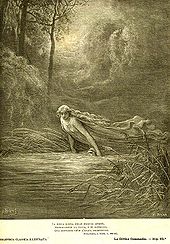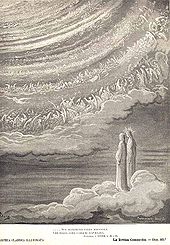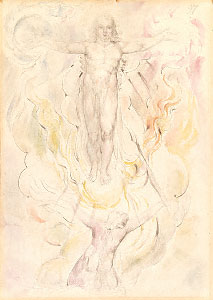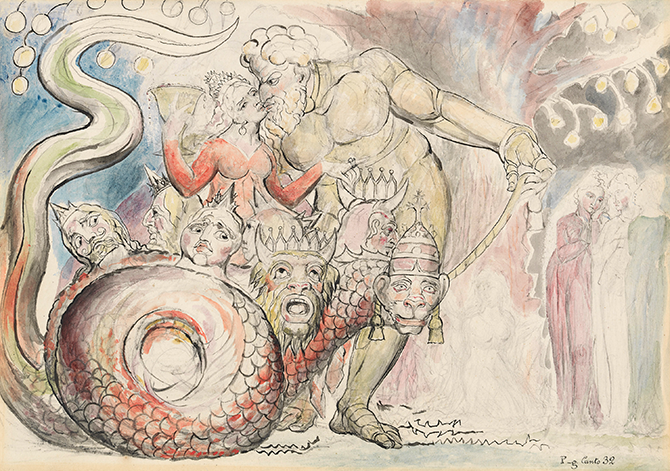this is perga 14:
Canto 29 of Dante's Purgatorio:
CANTO XXIX
Singing, as if enamour'd, she resum'd
And clos'd the song, with "Blessed they whose sins
Are cover'd." Like the wood-nymphs then, that tripp'd
Singly across the sylvan shadows, one
Eager to view and one to 'scape the sun,
So mov'd she on, against the current, up
The verdant rivage. I, her mincing step
Observing, with as tardy step pursued.
Between us not an hundred paces trod,
The bank, on each side bending equally,
Gave me to face the orient. Nor our way
Far onward brought us, when to me at once
She turn'd, and cried: "My brother! look and hearken."
And lo! a sudden lustre ran across
Through the great forest on all parts, so bright
I doubted whether lightning were abroad;
But that expiring ever in the spleen,
That doth unfold it, and this during still
And waxing still in splendor, made me question
What it might be: and a sweet melody
Ran through the luminous air. Then did I chide
With warrantable zeal the hardihood
Of our first parent, for that there were earth
Stood in obedience to the heav'ns, she only,
Woman, the creature of an hour, endur'd not
Restraint of any veil: which had she borne
Devoutly, joys, ineffable as these,
Had from the first, and long time since, been mine.
While through that wilderness of primy sweets
That never fade, suspense I walk'd, and yet
Expectant of beatitude more high,
Before us, like a blazing fire, the air
Under the green boughs glow'd; and, for a song,
Distinct the sound of melody was heard.
O ye thrice holy virgins! for your sakes
If e'er I suffer'd hunger, cold and watching,
Occasion calls on me to crave your bounty.
Now through my breast let Helicon his stream
Pour copious; and Urania with her choir
Arise to aid me: while the verse unfolds
Things that do almost mock the grasp of thought.
Onward a space, what seem'd seven trees of gold,
The intervening distance to mine eye
Falsely presented; but when I was come
So near them, that no lineament was lost
Of those, with which a doubtful object, seen
Remotely, plays on the misdeeming sense,
Then did the faculty, that ministers
Discourse to reason, these for tapers of gold
Distinguish, and it th' singing trace the sound
"Hosanna." Above, their beauteous garniture
Flam'd with more ample lustre, than the moon
Through cloudless sky at midnight in her full.
I turn'd me full of wonder to my guide;
And he did answer with a countenance
Charg'd with no less amazement: whence my view
Reverted to those lofty things, which came
So slowly moving towards us, that the bride
Would have outstript them on her bridal day.
The lady called aloud: "Why thus yet burns
Affection in thee for these living, lights,
And dost not look on that which follows them?"
I straightway mark'd a tribe behind them walk,
As if attendant on their leaders, cloth'd
With raiment of such whiteness, as on earth
Was never. On my left, the wat'ry gleam
Borrow'd, and gave me back, when there I look'd.
As in a mirror, my left side portray'd.
When I had chosen on the river's edge
Such station, that the distance of the stream
Alone did separate me; there I stay'd
My steps for clearer prospect, and beheld
The flames go onward, leaving, as they went,
The air behind them painted as with trail
Of liveliest pencils! so distinct were mark'd
All those sev'n listed colours, whence the sun
Maketh his bow, and Cynthia her zone.
These streaming gonfalons did flow beyond
My vision; and ten paces, as I guess,
Parted the outermost. Beneath a sky
So beautiful, came foul and-twenty elders,
By two and two, with flower-de-luces crown'd.
All sang one song: "Blessed be thou among
The daughters of Adam! and thy loveliness
Blessed for ever!" After that the flowers,
And the fresh herblets, on the opposite brink,
Were free from that elected race; as light
In heav'n doth second light, came after them
Four animals, each crown'd with verdurous leaf.
With six wings each was plum'd, the plumage full
Of eyes, and th' eyes of Argus would be such,
Were they endued with life. Reader, more rhymes
Will not waste in shadowing forth their form:
For other need no straitens, that in this
I may not give my bounty room. But read
Ezekiel; for he paints them, from the north
How he beheld them come by Chebar's flood,
In whirlwind, cloud and fire; and even such
As thou shalt find them character'd by him,
Here were they; save as to the pennons; there,
From him departing, John accords with me.
The space, surrounded by the four, enclos'd
A car triumphal: on two wheels it came
Drawn at a Gryphon's neck; and he above
Stretch'd either wing uplifted, 'tween the midst
And the three listed hues, on each side three;
So that the wings did cleave or injure none;
And out of sight they rose. The members, far
As he was bird, were golden; white the rest
With vermeil intervein'd. So beautiful
A car in Rome ne'er grac'd Augustus pomp,
Or Africanus': e'en the sun's itself
Were poor to this, that chariot of the sun
Erroneous, which in blazing ruin fell
At Tellus' pray'r devout, by the just doom
Mysterious of all-seeing Jove. Three nymphs
at the right wheel, came circling in smooth dance;
The one so ruddy, that her form had scarce
Been known within a furnace of clear flame:
The next did look, as if the flesh and bones
Were emerald: snow new-fallen seem'd the third.
Now seem'd the white to lead, the ruddy now;
And from her song who led, the others took
Their treasure, swift or slow. At th' other wheel,
A band quaternion, each in purple clad,
Advanc'd with festal step, as of them one
The rest conducted, one, upon whose front
Three eyes were seen. In rear of all this group,
Two old men I beheld, dissimilar
In raiment, but in port and gesture like,
Solid and mainly grave; of whom the one
Did show himself some favour'd counsellor
Of the great Coan, him, whom nature made
To serve the costliest creature of her tribe.
His fellow mark'd an opposite intent,
Bearing a sword, whose glitterance and keen edge,
E'en as I view'd it with the flood between,
Appall'd me. Next four others I beheld,
Of humble seeming: and, behind them all,
One single old man, sleeping, as he came,
With a shrewd visage. And these seven, each
Like the first troop were habited, but wore
No braid of lilies on their temples wreath'd.
Rather with roses and each vermeil flower,
A sight, but little distant, might have sworn,
That they were all on fire above their brow.
Whenas the car was o'er against me, straight.
Was heard a thund'ring, at whose voice it seem'd
The chosen multitude were stay'd; for there,
With the first ensigns, made they solemn halt
.jpg/800px-Beatrice_Addressing_Dante_(by_William_Blake).jpg) |
| Beatrice Addressing Dante, by William Blake, showing the "chariot triumphal" bearing Beatrice and drawn by the Griffin, as well as four of the ladies representing virtues, Canto 29. |
The Earthly Paradise

Beatrice Addressing Dante, by
William Blake, showing the "chariot triumphal" bearing Beatrice and drawn by the Griffin, as well as four of the ladies representing virtues, Canto 29.
At the summit of Mount Purgatory is the Earthly Paradise or
Garden of Eden.
[60] Allegorically, it represents the state of innocence that existed before
Adam and
Eve fell from grace – the state which Dante's journey up Mount Purgatory has been recapturing.
[60] Here Dante meets Matilda, a woman whose literal and allegorical identity "is perhaps the most tantalizing problem in the
Comedy."
[60] Critics up to the early twentieth century have connected her with the historical
Matilda of Tuscany,
[61] but others suggested a connection with the dream of
Leah in Canto XXVII.
[62] However, Matilda clearly prepares Dante for his meeting with
Beatrice,
[60] the woman to whom (historically) Dante dedicated his previous poetry, the woman at whose request (in the story) Virgil was commissioned to bring Dante on his journey,
[63] and the woman who (allegorically) symbolizes the path to God
[64] (Canto XXVIII).
With Matilda, Dante witnesses a procession which forms an allegory within the allegory, somewhat like
Shakespeare's
play within a play. It has a very different style from the
Purgatorio as a whole, having the form of a
masque, where the characters are walking symbols rather than real people. The procession consists of (Canto XXIX):
- "twenty-four elders"[65] (a reference to Revelation 4:4[66]), representing the 24 books of the Hebrew Bible, as classified byJerome[67]
- "four animals" with "six wings as plumage"[68] (a reference to Revelation 4:6–8[69]), a traditional representation of the four Evangelists[67]
- "a chariot triumphal on two wheels,"[70] bearing Beatrice, which is drawn by…
- a griffin,[71] representing the conjoined divinity and humanity of Christ[67]
- "three circling women" coloured red, green, and white,[72] representing the three theological virtues: Love, Hope, and Faith, respectively[67]
- "four other women"[73] dressed in purple,[74] representing the four cardinal virtues: Prudence, Justice, Temperance, and Fortitude[67]
- "two elders, different in their dress,"[75] representing the Acts of the Apostles and the Pauline epistles[67]
- "four of humble aspect,"[76] representing the general epistles[67]
- "when all the rest had passed, a lone old man,"[77] representing the Book of Revelation[67]
The appearance of Beatrice,
[78] and a dramatic reconciliation scene between Beatrice and Dante, in which she rebukes his sin (Cantos XXX and XXXI), help cover the disappearance of Virgil, who, as a symbol of non-Christian philosophy and humanities, can help him no further in his approach to God
[79] (and in the rest of the
Divine Comedy, Beatrice is Dante's guide):
"But Virgil had deprived us of himself,
Virgil, the gentlest father, Virgil, he
to whom I gave my self for my salvation;
and even all our ancient mother lost
was not enough to keep my cheeks, though washed
with dew, from darkening again with tears."
[80]

Matilda helps Dante pass through the River
Lethe, Canto 31.
Dante then passes through the River
Lethe, which erases the memory of past sin (Canto XXXI),
[81] and sees an allegory of Biblical and Church history, in which the chariot plays the role of the Church. This allegory includes a denunciation of the corrupt papacy of the time, and its ties to the French monarchy
[82] (Canto XXXII):
"Just like a fortress set on a steep slope,
securely seated there, ungirt, a whore,
whose eyes were quick to rove, appeared to me;
and I saw at her side, erect, a giant,
who seemed to serve as her custodian;
and they again, again embraced each other."
[83]
Finally, Dante drinks from the River
Eunoë, which restores good memories, and prepares him for his ascent to Heaven (described in the
Paradiso). As with the other two parts of the
Divine Comedy, the
Purgatorio ends on the word "stars" (Canto XXXIII):
"From that most holy wave I now returned
to Beatrice; remade, as new trees are
renewed when they bring forth new boughs, I was
pure and prepared to climb unto the stars."
[84]







.jpg/800px-Beatrice_Addressing_Dante_(by_William_Blake).jpg)


